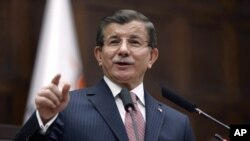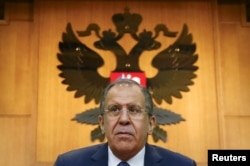Turkey is insisting the Syrian Kurdish group the PYD be excluded from planned Syrian peace talks in Geneva. Ankara accuses the group of being a terrorist organization. The dispute is casting doubt over the talks, but Ankara is finding itself increasingly isolated.
Turkish Prime Minister Ahmet Davutoglu, speaking in parliament Tuesday, reiterated his stance the Syrian Kurdish group the PYD and its armed militia, YPG, are terrorist organizations, and have no place at peace talks on Syria in Geneva.
Davutoglu accused the groups of being extensions of the Kurdish rebel group the PKK, which Turkish security forces are fighting.
But Carnegie Europe visiting scholar Sinan Ulgen said Ankara was finding itself increasingly isolated.
"There is no willingness on the Turkish side to carve out a space for the Syrian Kurds, on the other hand the Syrian Kurds are viewed from Washington as being successful in fighting the Islamic State on the ground. So there the U.S. approach is closer to Russia that wants to give a bigger role to the Syrian Kurds at the negotiating table," said Ulgen.
Russia Foreign Minister Sergei Lavrov warned Tuesday the Geneva talks would fail if the PYD was excluded. On Monday in Ankara, EU foreign affairs commissioner Frederica Mogherini stressed the importance of the widest participation at the Geneva talks.
Political scientist Cengiz Aktar, of Istanbul’s Suleyman Sah University, said Ankara viewed the dispute as an important test of its power in the region.
"Turkish government is adamant, it does not want the Syrian Kurds in Geneva. The last time they managed to keep the Syrian Kurds out, we will see this time, what will be exact weight, and importance of Turkey, regarding the future of Syria. And the test will be whether the condition of Turkey will be excepted or not," said Aktar.
In an attempt to build support, Davutoglu is due to visit key regional ally Saudi Arabia later this week. Turkish Foreign Minister Mevlut Cavusoglu spoke twice this week with his U.S. counterpart, John Kerry, on the issue.
But Cumhuriyet newspaper political columnist Semih Idiz said with Ankara having few allies, its options were limited.
"The only thing it can do is boycott the Geneva talks. Of course they might be intermediary formula, where the PYD is represented under the American established Syrian Democratic Forces, which everyone really knows is a Kurdish entity and Turkey may have to accept that.Other than that I do not think it has any leverage in this regard."
Pro-government media has suggested Ankara has threatened to boycott the Geneva talks, but analysts says such a move is risky, with Turkey’s leaders well aware of the old diplomatic adage, "If you are not at the table, you will likely be on the menu."












